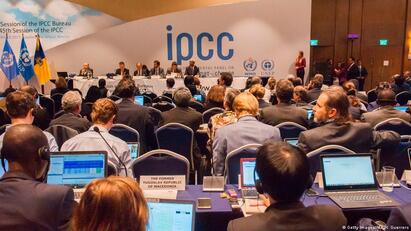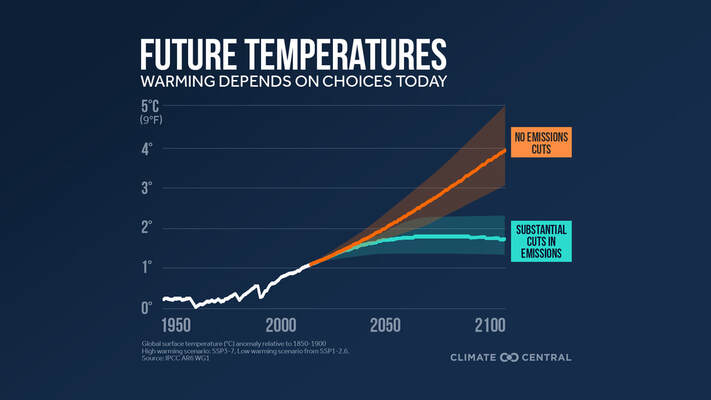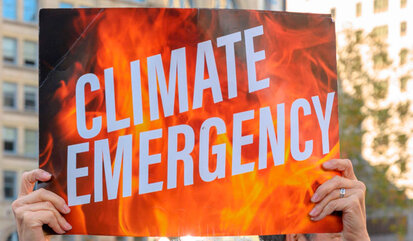 The IPCC's next big meeting is in Dubai in November, 2024. Dubai's top exports are oil and natural gas.
The IPCC's next big meeting is in Dubai in November, 2024. Dubai's top exports are oil and natural gas. Before these questions can be answered, we need to know where things stand right now. There's a consensus among world leaders, and in the mainstream press, that it would be a bad idea to allow temperatures to increase beyond 1.5 degrees Celsius above pre-industrial levels. However, if that firewall is breached, it's generally believed that extremely dire or calamitous effects can be averted by limiting temperature increases to 2 degrees Celsius. These views are derived primarily from reports by the Intergovernmental Panel on Climate Change (IPCC), which collects recent scientific research and produces a document every year or two (here's the 2023 one).
For a report to be issued, all IPCC member countries must agree to its wording. Among the 195 IPCC member countries are authoritarian petro-states Russia, Kazakhstan, Saudi Arabia, Iran and Venezuela. No wonder that IPCC reports are play-it-safe, committee products. The IPCC's assertions are inherently conservative, driven as much by the dictates of consensus politics as by science. Every sentence is argued over. Every statement is sanded down and qualified. Rest assured, the IPCC is not a radical organization.
 Courtesy Climate Central, graph produced from the IPCC's 6th Assessment Report.
Courtesy Climate Central, graph produced from the IPCC's 6th Assessment Report. That's nice to hear. Just one problem: it's probably wrong. Very soon, temperature may approach 1.5 C degrees. See this recent article by eminent climate change researcher James Hansen, of Columbia University. Hansen and colleagues have calculated that this year's resumption of the El Nino global weather pattern, combined with the recent reduction of sulfur levels in fuel emissions -- sulfur not only causes terrible air pollution, but masks temperature increases due to global warming -- will bring us to 1.4-1.5 degrees C in late 2024.
Okay, then. That kinda sucks. But we still have the 2 degree C goal to rally around, right? Well, actually, we may not. And here I refer to an earlier blog by yours truly, on August 24, 2021. It concerns "timing issues" and cites a paper by Katherine L. Ricke and Ken Caldeira: Maximum Warming Occurs About One Decade After A Carbon Dioxide Emission. Translated: fossil fuel emissions are lazy creatures that take roughly ten years to fully set up shop in the atmosphere. They don't kick in right away. Therefore, the last ten years' worth of emissions -- a staggering amount, far higher than the previous ten years -- are only partially affecting current temperatures. Time to do a little arithmetic! According to IPCC projections, the "no emissions cuts" pathway produces about .4 degrees of warming per decade (see graph above). That pathway charitably describes the past ten years; in fact, 2022 won the prize for most CO2 ever disgorged: 38.6 gigatons. If we estimate that roughly half of the temperature effect from the past ten years' emissions has already kicked in, then we have another .2 C baked in and yet to register, based entirely on past behavior.

And what will a world at 2.5 degrees C look like? Google it yourself; it ain't pretty. You'll find plenty of articles about the chaos/collapse/calamity to be avoided by staying under 2 degrees.
You see the mess we're likely in? Now, I don't believe that the public is being deliberately deceived, that there's some kind of conspiracy at work. Influential groups and individuals could simply be hewing to the inadequate consensus established by the IPCC. Maybe we're seeing an instinctive avoidance of what's perceived as worst-case, catastrophic scenarios. Of course, any facts that indict the hyper-consumerism and growth mandates of modern capitalism are to be doubted, and let's not forget the political tendency to not get too far ahead of what the public seems ready to accept (looking at you, Joe Biden). I guess there are inconvenient truths and then there are very inconvenient truths.
At any rate, the Climate Crisis appears to be reaching an emergency state, but the vast majority of people on the planet haven't a clue because our leaders in the political and media spheres, as well as within the mainstream environmental movement, are failing to explain the situation accurately.
Until they do, forcefully, there seems little chance that our collective response to climate change will be anything but too little, too late.
 RSS Feed
RSS Feed